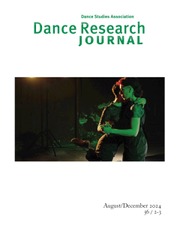Dear Mark Franko,
I deeply appreciate your dedication to publishing articles that speak to dance's inter-embodiment with human issues internationally and interculturally. I am particularly moved by the article appearing in the Winter 2010 issue, “Performing Acupuncture on a Necropolitical Body: Choreographer Faustin Linyekula's Studios Kabako in Kisangani, Democratic Republic of Congo,” written by Ariel Osteweis Scott. Linyekula was quoted as stating, “Improvisation here is not an aesthetic luxury, but a state of living, surviving: in such a hostile context, where no one really knows what tomorrow will be made of (another war? An [epidemic]?), one needs to know how to improvise to remain alive.” This article provides specific and inspiring examples of how Faustin Linyekula is using the processes and performance of dance to heal not only himself, but a city, a country, a continent, humanity, while all remain partly diseased. I wonder how such information could impact a young American suburban ballerina, for example, who reads Dance Magazine. I am motivated to continue working in the zone between seemingly distinct paradigms of dance, between academia and the field, between Africa and European America. I appreciate your work! Thank you!
Sincerely,
To Whom It May Concern,
Thank you for Gabriele Brandstetter's article, “Dancing the Animal to Open the Human: For a New Poetics of Locomotion,” in Dance Research Journal 42(1), Summer 2010. The author's discussion of Arnold Gehlen's anthropological view of humans as homo inermis (unarmed and defenseless) gave me a new understanding of society's tendency toward excess.
Reading this article, I realized that most humans are high tech imitators not innovators. As a species whose innate defense is intellect, it makes sense for humans to reproduce and augment the ideas available to them in nature. From art to technology, we find confidence in appropriation, which allows us experiences without responsibilities. But is this a good thing? It seems humans have become victim to intellect, our complex lives fueling stress and dissatisfaction.
Brandstetter addresses Hegel stating “man is the animal that knows it is an animal and is consequently able to transcend the animal sphere.” Perhaps it is the surpassing of the animal sphere that leaves humans unsatisfied. If we embrace our animalistic being, we may find happiness in the simplicity of what we are instead of the complexity of what we have.
Sincerely,




